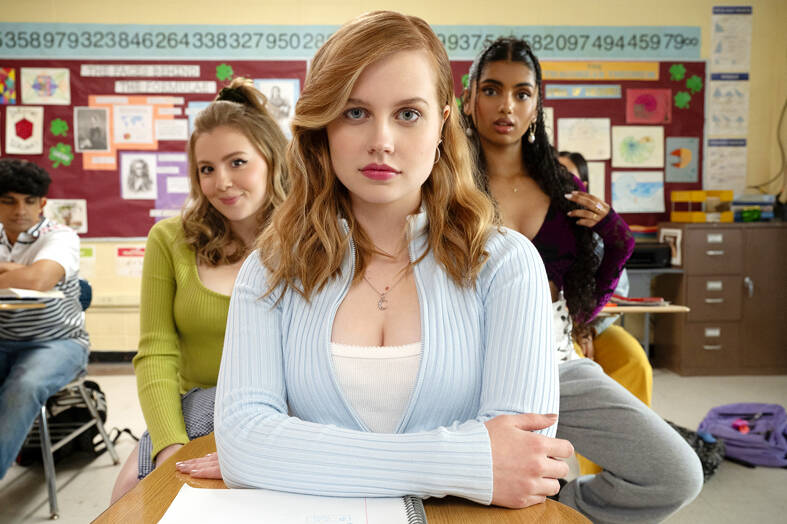The first Mean Girls, that compulsively watchable high-school based social satire by Tina Fey, came out in 2004. The Broadway musical opened in 2018. Now it’s 2024, and we have a screen adaptation of the theater adaptation. How long will this reconfiguring go on? Is there a limit?
Or ... does the limit not exist?
Forgive us that utterly blatant setup for one of the original’s most famous lines. It’s just that some of them are so darned memorable. Like, “You can’t sit with us!” — screeched. Or when Regina, the haughtiest queen bee ever to carry a cafeteria tray, scathingly tells her minion Gretchen, who’s trying out her new word “fetch,” to “Stop trying to make ‘fetch’ happen. It’s NOT going to happen!!”

Photo: AP
But even in Mean Girls 17, should it come to that, someone will still be trying to make “fetch” happen. And it’s actually not a bad word to describe the experience of watching the new Mean Girls — a slick, fizzy bit of entertainment that’s occasionally delightful and usually fun, even if the translation to 2024 definitely has its rough spots.
If you’ve recently re-watched the first film, you may be surprised here at how many lines remain, word for word. What’s impressive is how many still work — unlike some social comedies that felt right 20 years ago but have scenes that fall with a thud now (see Love Actually).
There are exceptions, though. I’ll confess to feeling queasy throughout about the “dumb girl” character who remains in the Plastics, Regina’s social group. There is, thankfully, no more reference to a coach sleeping with a student, which would not have been funny, even with Jon Hamm as the coach. Slut-shaming has been conspicuously toned down — the insult in Regina’s famous Burn Book is now “cow” and not “slut.”

Photo: AP
On the other hand, fat-shaming? That’s still there, as when the camera zooms in rudely on the rear end of a character who’s gained a few pounds.
As for the casting, some of it works wonderfully, particularly the duo who introduce the film, which is again written by Fey, with music by Jeff Richmond (her husband), and lyrics by Nell Benjamin. Damian, the beloved character described affectionately by Janis as “almost too gay to function” (but that’s only OK when she says it), and Janis, his best friend, a talented artist whose fallout with Regina left her in the dirt socially, function almost as quasi-narrators. Jaquel Spivey, of Broadway’s A Strange Loop, is hilarious and also moving as Damian — you wait for each new line, and he wastes none of them. And Auli’i Cravalho as Janis has a gorgeous voice and charismatic screen presence. (And a huge song, though from the trailer, you wouldn’t know anyone has songs at all.)
Angourie Rice is the new Cady, the Lindsay Lohan role, a home-schooled math whiz who arrives in suburban Chicago straight from Kenya, where her mother was doing zoological research, into the snake pit of high school. Rice is a sweet presence but not as convincing in the “bad Cady” moments as Lohan. As for the Plastics, singer Renee Rapp, formerly Regina on Broadway, imbues the role with powerhouse vocals and an angrier edge than the excellent Rachel McAdams did — when she’s enraged, boy, you feel it.

Photo: AP
Once again, Cady begins her first school day in math class with Ms. Norbury, once played by Fey — and again by Fey! Tim Meadows is also back as the principal; both look older but certainly not two decades.
Cady has a rough entry and ends up eating lunch in a bathroom stall, but is rescued by Janis and Damian. In the cafeteria, she has her first encounter with Queen Bee Regina. “My name is Regina George,” sings Rapp, in some of the show’s best lyrics, “I am a massive deal. I don’t care who you are, I don’t care how you feel.”
The Plastics — Regina, needy Gretchen (Bebe Woods) and intellectually challenged Karen (Avantika) — adopt Cady and teach her the rules: Wear pink on Wednesdays. No tank tops two days in a row. A ponytail? Once a week. Also: You can’t date someone’s ex-boyfriend, because those are “the rules of feminism.” At such moments, one can literally hear Fey writing the line. (Side note: Please come back to the Golden Globes, Tina, and bring Amy Poehler.) (Speaking of Poehler, she is missed as Regina’s “cool” mom, but aptly replaced by Busy Philipps.)
Things go south quickly when Cady falls for Regina’s ex, Aaron, who sits in front of her in AP Calculus (leading to the excellent lyric “Calcu-lust.”) Regina isn’t going to give up Aaron without a dirty fight. So Cady, aided by Damian and Janis, plots to bring Regina down from inside, pretending to be a loyal Plastic.
But at what point does Cady stop pretending and BECOME a Plastic? (Ask Janis.)
Directors Samantha Jayne and Arturo Perez Jr. keep the action moving briskly. A key visual difference is technology. In the 2004 film, friends spoke to each other on the telephone, in split screens. Now, of course, gossip and bullying take place via social media. In some ways this makes it all seem more vicious. When Regina takes an embarrassing tumble onstage at the Christmas performance, we witness a social media shaming that is much crueler than anything that happened in the 2004 version.
And yet, it’s believable, of course. One comes away from this latest Mean Girls thinking that in some ways things may have gotten better for high schoolers than they were in 2004 — but in other ways, things have only gotten meaner.

Nov. 11 to Nov. 17 People may call Taipei a “living hell for pedestrians,” but back in the 1960s and 1970s, citizens were even discouraged from crossing major roads on foot. And there weren’t crosswalks or pedestrian signals at busy intersections. A 1978 editorial in the China Times (中國時報) reflected the government’s car-centric attitude: “Pedestrians too often risk their lives to compete with vehicles over road use instead of using an overpass. If they get hit by a car, who can they blame?” Taipei’s car traffic was growing exponentially during the 1960s, and along with it the frequency of accidents. The policy

Hourglass-shaped sex toys casually glide along a conveyor belt through an airy new store in Tokyo, the latest attempt by Japanese manufacturer Tenga to sell adult products without the shame that is often attached. At first glance it’s not even obvious that the sleek, colorful products on display are Japan’s favorite sex toys for men, but the store has drawn a stream of couples and tourists since opening this year. “Its openness surprised me,” said customer Masafumi Kawasaki, 45, “and made me a bit embarrassed that I’d had a ‘naughty’ image” of the company. I might have thought this was some kind

What first caught my eye when I entered the 921 Earthquake Museum was a yellow band running at an angle across the floor toward a pile of exposed soil. This marks the line where, in the early morning hours of Sept. 21, 1999, a massive magnitude 7.3 earthquake raised the earth over two meters along one side of the Chelungpu Fault (車籠埔斷層). The museum’s first gallery, named after this fault, takes visitors on a journey along its length, from the spot right in front of them, where the uplift is visible in the exposed soil, all the way to the farthest

The room glows vibrant pink, the floor flooded with hundreds of tiny pink marbles. As I approach the two chairs and a plush baroque sofa of matching fuchsia, what at first appears to be a scene of domestic bliss reveals itself to be anything but as gnarled metal nails and sharp spikes protrude from the cushions. An eerie cutout of a woman recoils into the armrest. This mixed-media installation captures generations of female anguish in Yun Suknam’s native South Korea, reflecting her observations and lived experience of the subjugated and serviceable housewife. The marbles are the mother’s sweat and tears,